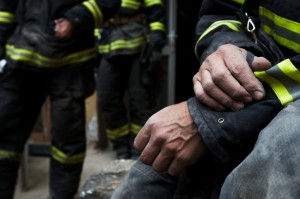By Leischen Stelter
Earlier this year I wrote an article about mental health in law enforcement. The National Study of Police Suicides (NSOPS) released a report in January 2013 that found suicide was once again the leading cause of police deaths in 2012. While suicide rates were down by 14% from 2009 (the last time this survey was conducted), the fact remains that suicides are too prevalent.
For that particular article, I spoke with Ron Clark, Sergeant (Ret.) of the Connecticut State Police, who was one of the lead researchers of this study. One thing he said really stuck out:
“Everything is focused on suicide, but that is not the real issue. The real issue is mental wellness of officers,” he said.

And—as is the case for many of those in the public safety sector who are regularly subjected to atrocious and traumatic situations—all the memories of death and pain and the terrible things he had seen and experienced as a firefighter came rushing back to him. The suicide of his brother opened the “filing cabinet,” he said, of all the bad memories and experiences he’d had, which compounded his current trauma.
Wines’ article doesn’t dance around his pain or try to cover up his struggles. He openly discusses his depression, his drinking, and his withdrawal from family and friends:
“I spent most days alone and crying, trying to drink enough to dull my thoughts and the pain. I couldn’t think straight or concentrate on any single task. Every day, I knew I needed to get out of bed and do SOMETHING… ANYTHING, but I just couldn’t make myself do it. I felt as if I were (or may go) insane. I didn’t talk to my friends or family about what I was going through because I didn’t want to hurt them too. I didn’t want to talk to someone else because I didn’t think they’d understand.”
What helped him get out of this mental abyss?
A fellow firefighter. Wines didn’t just receive recognition from his friend that he was going through a tough time. His friend got him help. His friend made him get help. It is one thing to recognize that someone we care about is suffering, but it takes all levels of courage to get them the help they need.
Wines says it saved his life.
But the blog post doesn’t end there. Wines doesn’t pretend that recovery is easy or straightforward. He discusses the reality of being admitted into a psychiatric facility, seeing a counselor (several actually), and taking prescription medication to help get him back on course.
He is recovering day-by-day. He is back on duty. He is proof that you can reach the bottom and come back to the surface. It is a personal and painful story about taking the steps necessary to get your life back and it is proof that you need not lose hope when you are at your lowest.
I hope this article and Wines’ message is shared with all those who work in public safety. For too long, public safety professionals have buried their emotions, their pain, and the traumas they have experienced during their careers deep down inside them, hoping they can’t resurface. Well they do resurface. You can’t hide from it. So as Wines says: Seek help. Take care of yourself, physically and mentally. Here are more of his lessons for you:
- First, what you’re feeling will never go away but it will get easier. Now that you know that, don’t wait as long as I did… SEEK HELP EARLY. There is NO SHAME in asking for help and you will not survive this alone (I’ll have links below).
- Look for—but don’t limit yourself to—counselors with firefighting backgrounds. Open the door and start the process (take that first step) and then let them help you find someone who fits your treatment needs.
- Don’t be afraid of medications. The right ones, at the right dosage, can help.
- Don’t be alone. By that I mean “by yourself”. As hard as it is, try to stay around people, it’s much harder to cope when your alone and way too easy to make the wrong (or poor) decisions. Keep yourself busy. Find or make some kind of routine and stick to it … make yourself do it… ANYTHING other than sitting alone.
- Stay away from the drinking. We all know alcohol is a depressant and only deepens and adds to the depression you’re already suffering through. You CANNOT drink enough to make it go away. When you wake up, you’ll be right back in that place you were trying to escape from.
- Don’t lie. To yourself or those worried or asking about you. If you’re not “alright” say so.
- Know that it’s ok to cry … to show emotion … even if it’s at the station. WE’RE HUMAN.
- Don’t think that you don’t have options because YOU DO.
- TALK. Talk to your family and friends. Hiding or not sharing your feelings or story with them hurts more than telling them the truth no matter how bad it may be.
- Learn the signs of stress, depression and PTSD. Look for them in your brothers and sisters. If you see it, ACT ON IT. Marital problems, financial issues, health concerns, the death of a family member, job related incidents etc., are just a few examples that can trigger stress and depression.
- Don’t pass on a presentation on mental health and wellness for some type of H.O.T (Hands on Training) class. Our mental health and wellness should be THE TOP PRIORITY for the fire service and until it is nationwide, MAKE IT YOURS!
What would you add to this list? Don’t forget to read the blog post in entirety here.
Comments are closed.